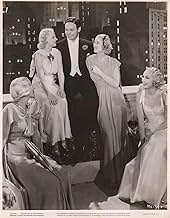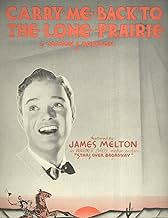Agrega una trama en tu idiomaAl is a down-on-his-luck promoter who is thinking of taking the final bow when he meets singing porter Jan. He sees something in Jan so he signs him to a contract. Al works odd jobs to pay f... Leer todoAl is a down-on-his-luck promoter who is thinking of taking the final bow when he meets singing porter Jan. He sees something in Jan so he signs him to a contract. Al works odd jobs to pay for Jan's singing lessons and drops the idea of Opera when he learns that it will take year... Leer todoAl is a down-on-his-luck promoter who is thinking of taking the final bow when he meets singing porter Jan. He sees something in Jan so he signs him to a contract. Al works odd jobs to pay for Jan's singing lessons and drops the idea of Opera when he learns that it will take years. He has him sing in a nightclub and from there it is up. But Jan soon starts missing les... Leer todo
- Dirección
- Guionistas
- Elenco
- John - 'At Your Service, Madame' Number
- (sin créditos)
- Mustached Man at Champ's Table
- (sin créditos)
- Man Wanting Testimonial
- (sin créditos)
- Jim Flugel
- (sin créditos)
- Man in Church
- (sin créditos)
- Charlie
- (sin créditos)
- Listener in Italy Montage
- (sin créditos)
- Man
- (sin créditos)
Opiniones destacadas
Fortunately the film has Pat O'Brien, Frank McHugh and Marie Wilson to inject some life into the proceedings but even with them it's an average affair.
The real reason to catch this is the presence of Jane Froman in the cast. The singer famed for her war work and catastrophic accident immortalized in With a Song in My Heart didn't make many films and while this one isn't much she sings beautifully.
The scenario begins at New York City's Madison Square Garden where Al McGillevray (Pat O'Brien), a down-and-out agent in desperate need of cash yet refusing job charities from friends. After a gathering with newspaper reporters at Danceland where he is told he's all "washed up," Al returns to his hotel room with the intentions of ending his life. At that very moment he takes his gun from the drawer, Al encounters Jan Linzimski (James Melton), a singing porter with a pleasing voice and immediately abandons his suicidal tendencies to promote his latest discovery, renamed Jan King. Al sacrifices everything he has for the sake of Jan, working odd jobs and long hours to help pay Senior Minotti (William Riccardi) for his singing lessons, placing him in auditions at talent shows and radio programs where he sings contemporary songs instead of his major preference, opera. In time, Jan makes it to the top of the charts, but with success comes failure after teaming with Joan Garrett (Jane Froman), a singer who leads him to wild parties and heavy boozing causing serious damage to his voice and performances that puts an end to his career on Broadway. Feeling somewhat responsible for his setback, Al makes every effort to bring Jan back to his senses regardless of their serious argument that put an end to their partnership. Adding to Al's worries is Norma Wyman (Jean Muir), a young hopeful from Connecticut wanting a chance at a singing career herself, but because he doesn't want this nice girl to end up like Jan, Al does his best to discourage her while she makes every attempt to succeed, in spite of setbacks and tragedy.
Other featured players include Frank McHugh as "Offkey" Cramer, a song plaguer; Marie Wilson as Molly, a telephone operator and Cramer's love interest; and Frank Fay as the sarcastic radio talent show master of ceremonies whose big encounter of the evening being a group of children called "The Morgan Family." Appearing in smaller parts are Paul Porcasi, Eddie Kane, E.E. Clive, and heavyweight boxing champion, Jack Dempsey, playing himself.
The motion picture soundtrack, with new songs by Harry Warren and Al Dubin include: "Carry Me Back to the Lone Prairie" by Carson J. Robison (sung by James Melton); Guiseppi Verdi's "Aida" (Melton); "Open Up Them Pearly Gates" (sung by "The Morgan Family"); "You Let Me Down" (sung by Jane Froman in a torch song manner); "Coney Island" (sung by quartet); "Where Am I?," "Where Am I?" (both sung by Melton); "At Your Service, Madame" (with Jane Froman, Melton and male chorus); "Ave Maria" (sung by Jean Muir) by Franz Schubert; and "Aida" (finale with Melton).
While Bobby Connolly and Busby Berkeley are given joint collaboration credit as dance directors, only the eight minute "At Your Service, Madame" survives as its sole production number play enacted entirely in song. "September in the Rain" is often credited among the list of songs in STARS OVER Broadway, but is non-existent in the final print. It's reportedly a lavish scale dance number supervised by Berkeley that was either abandoned prior to filming or deleted upon completion.
In spite of occasional revivals on cable television's Turner Classic Movies since its premiere in 1994, "Stars Over Broadway" remains a forgotten item among the list of 1930s Warner Brothers musicals. Whenever it does turn up, it's usually part of TCM's tribute to either Busby Berkeley or tune-masters, Warren and Dubin. Of the three Warners musicals to feature Melton, "Stars Over Broadway" showcases him to best advantage, especially the singing category, but the screenplay, reminiscent to those used in early sound musicals or those produced at MGM whenever its turns dramatic, lacks strength or high points needed to make this something memorable. While Melton and Froman didn't fare well as screen celebrities of Hollywood, they obviously scored better individually whether at the Metropolitan, radio, television, or as stars over Broadway. (***)
O'Brien wants quick results, though, and betrays him, making him a more popular-style singer who can rake in the bucks. He does and stardom goes to his head but he takes to the sauce, betraying O'Brien in return.
This is not the first time I've seen O'Brien in a role that suggests gay or closeted gay feelings. The reconciliation between these two is strange indeed for a scene between two men in a mid-thirties movie.
O'Brien wants to make a star of Jean Muir, too, but Menotti hears her "Ave Marie" sung in church and doesn't think she has the goods. She and O'Brien end up together but the movie is really about his and Melton's characters.
It is dark and quite elegant, a touching movie whose title has little to do with it and is misleading. Perhaps O'Brien smiles once but if so, it is the exception rather than the rule. His performance is subdued and he seems beaten down.
The story starts out in a bar with down-on-his-luck agent/talent scout Al McGillevray (Pat O'Brien) being the butt of jokes at every table he visits in the joint. Disheartened, he goes back to his hotel and requests his trunk be brought up to his room, saying he's going to check out. He is - but not the way the night clerk thinks as Al has a gun in that trunk and plans to end it all. He changes his mind when happy singing porter Jan King (James Melton) arrives with his trunk and Al thinks he can make him into a sensation and finally become a big shot which seems to be his highest goal in life.
Al takes odd jobs in order to pay Jan's expenses during the weeks it takes for Jan to take some basic voice training from Professor Minotti, and then Jan makes his debut. Minotti wants to take Jan to Italy for lengthy training so that he can sing opera, since he has that potential. This doesn't mix with anxious Al's desire to drag Jan to the top as fast as possible so he can go around town crowing that he discovered him. What is dragged up fast can be dragged down in a hurry too, as Jan begins to be more interested in wine and women than song. Throughout all of this, there is the presence of a demure young woman, Nora, who wants to be a singer. She is constantly asking Al if he'll be her agent, and for some reason that's not clearly understandable, he keeps refusing. Things come to a head between Jan and Al when Jan not only is trashing his own career but is planning on making Nora another notch in his belt.
This one is a little light on dramatic enjoyment but I have to take my hat off to Pat O'Brien's acting here. His character starts out a weakling who is willing to end it all over nothing more than foolish pride, but by the end of the film I really admired the guy. On top of that there's some beautiful singing by James Melton in one of his very few film appearances of the 30's.
¿Sabías que…?
- TriviaMarie Wilson's first credited screen role.
- Bandas sonorasAt Your Service, Madame
(1935) (uncredited)
Music by Harry Warren
Lyrics by Al Dubin
Played during the opening credits
Also played when Freddy is introduced to Al and Jan at Witmark's
Performed by James Melton, Jane Froman and chorus
Selecciones populares
Detalles
- Tiempo de ejecución
- 1h 29min(89 min)
- Color
- Mezcla de sonido
- Relación de aspecto
- 1.37 : 1





































